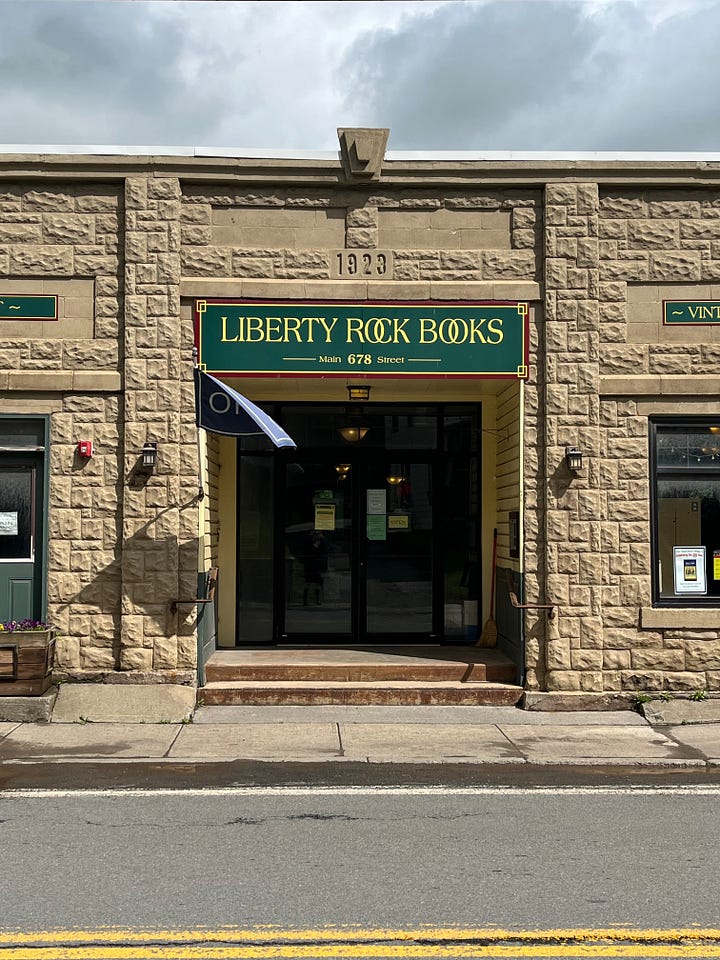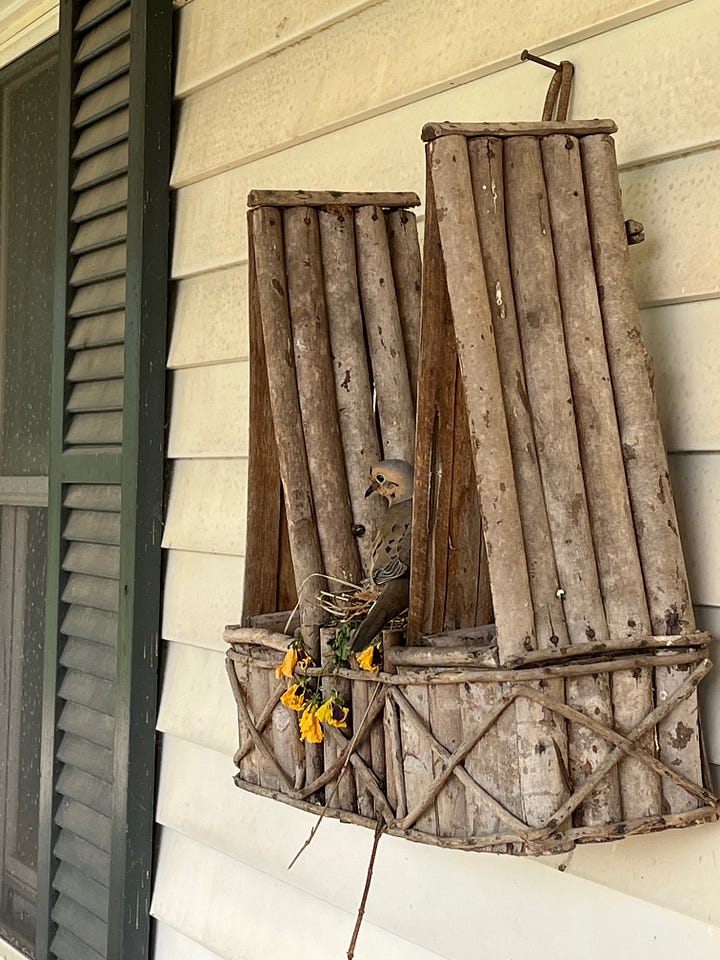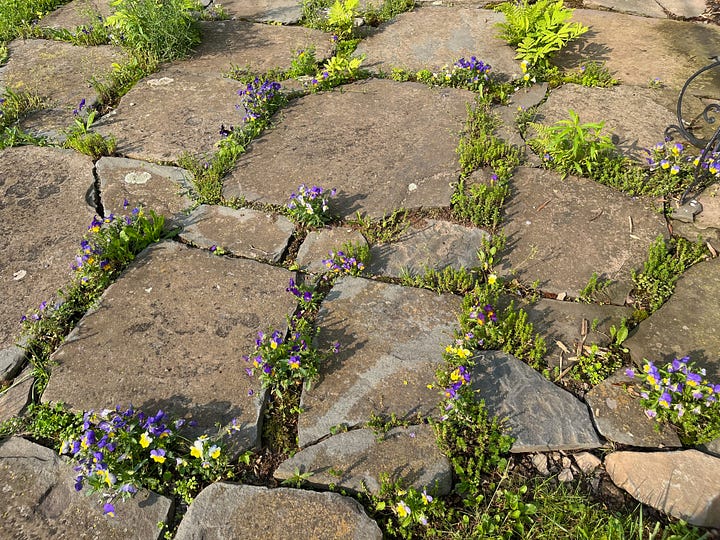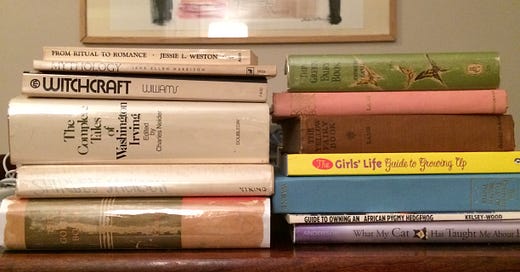“My mother shares her most pressing questions only with her Alexa.”
That’s the first line of an essay I may never write, an essay about something so personal I’ve almost never even talked about writing it: my difficult relationship with my mother.
But last weekend, I wrote the first paragraph. Then I read it aloud to a room full of strangers.
This took place at the Hobart Festival of Women’s Writers, held annually since 2012 in the Hobart “Book Village”: a tiny town in the north Catskills filled with secondhand bookshops. I’ve been visiting Hobart periodically over the past ten years, usually with one or two children in tow, to spend an afternoon browsing. Here’s our first haul, which included a first edition of Shirley Jackson’s We Have Always Lived in the Castle (for me) and What My Cat Taught Me About Life (for my kid).
On one of those trips, I saw an advertisement for the festival and put it on my mental bucket list for my next book. Last weekend, I finally had a chance to participate.
On a rainy Saturday morning, some twenty writers, published and aspiring, piled into one of the bookstores for a workshop called “Texts and Betrayal: Secrets and Boundaries.” The session was led by Irena Klepfisz, a poet, essayist, and child survivor of the Holocaust whose work I’ve long admired. After brief introductions, she led the group through a series of thought exercises. First, everyone brainstormed four topics we were afraid to write about. Then we imagined the consequences. Who would be upset? What would they say? How would we defend ourselves?
Irena’s calm, warm energy was infectious. One by one, we began to open up. One woman confessed to censoring herself even in her own journal, for fear her children might find it later. In response, Irena shared her experience of discovering revelations after her own partner’s death: “hard, but not terrible,” as she put it.
Then she had us work through an imagined dialogue with someone who might be upset by our writing. What would they say? Who would they say it to? What would we say in response? “All writing is a betrayal,” Irena said. But if you don’t have the courage to speak your truth, you betray yourself.
Finally, she asked us to start writing the thing we feared and to share it, if we were able. Unbelievably, many of us did. One woman wrote about feeling like a third wheel in the presence of her husband and his secretary. Another wrote about an unexpected pregnancy; a third, about an abortion. I left amazed at the trust and support that could develop among a group of strangers in the space of only two hours.




The next day, another group gathered for a workshop I taught. The focus was meant to be on incorporating arts criticism into personal essays, but a number of the participants wanted to talk about getting and giving constructive feedback. We ended up doing both. I had asked the participants to bring—or search for—an image important to them for a writing exercise. Again, the results were fascinating and varied. One woman chose the famous photograph of workmen taking a break atop a skyscraper beam; we were all surprised to learn that the men are holding WPA flyers rather than lunches. Another chose a self-portrait in which she replaced her own nose with a tree.
Driving home that afternoon, I felt elated. I’ve been teaching writing on the university level for more than a decade, but this experience was different. There was something deeply moving about the way this group of women joined together for the sole purpose of improving their craft in community. There were no grades, no fellowships, no competition—only support.
One participant in the memoir session worried that her children would throw out her writing after her death. “Who cares about Mom’s inner life?” she asked, only half joking. Well, I do. The single line about biography that has always resonated with me most comes from Virginia Woolf, who writes in A Room of One’s Own that she would rather read the “true history” of “the girl behind the counter” than yet another life of Napoleon or Keats. We all are the girl behind the counter, and the stories of our lives matter.
Inspired by this experience, I’d like to do some teaching and coaching apart from my academic work. Would you be interested in taking a seminar with me, either in person or online? If so, what would be your preferred topic? Send me an email or let me know in the comments.
Where I’ll be
June 18, 6:30 p.m.: In conversation with Ross Benjamin at Big Red Books in Nyack, NY. RSVP here.
June 26, 2 p.m. (online): The Leo Baeck Institute Book Club.
From the Shirley Jackson files
Substacker Jan Harayda is leading a discussion on “The Lottery,” which is about to celebrate the seventy-seventh anniversary of its publication.
As ever,
Ruth






Thanks for describing Hobart, I’ve been intrigued by that festival and haven’t made my way over yet. I would love to work with you in an online or in person workshop.
Write that essay please… xx